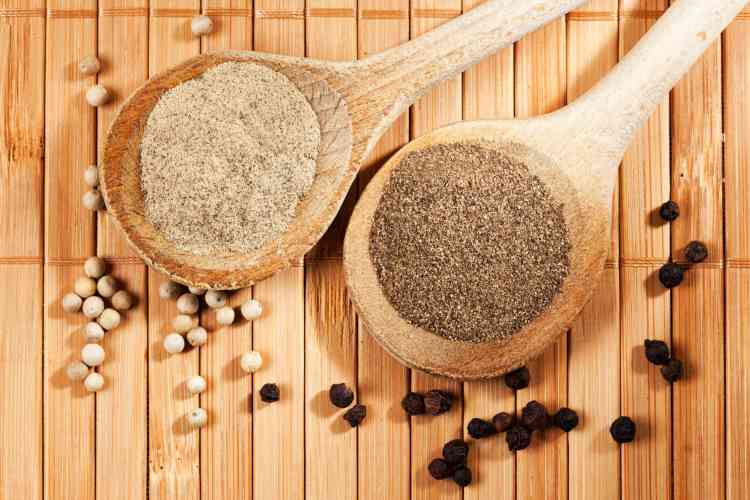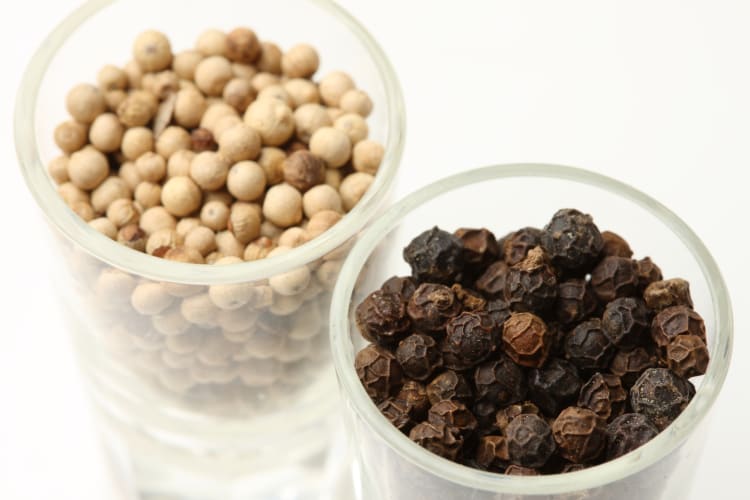White Pepper vs. Black Pepper: What's the Difference?

Have you ever wondered about the differences and similarities between white pepper vs. black pepper? Spoiler alert: they differ in more than just color — they also vary in flavor and health benefits.
As you organize your spice cabinet, putting away your paprika, oregano and other seasonings, consider the dishes you typically use black pepper in. Do you reach for white pepper as well, or is it missing from your collection? Keep reading to explore the ins and outs of both spices and finally discover what the difference is between white pepper and black pepper.
Jump to Section
- What Is White Pepper Used for in Cooking?
- What Is Black Pepper Used for in Cooking?
- What Similarities Are There Between White Pepper and Black Pepper?
- What Is the Difference Between White Pepper and Black Pepper?
- Can I Substitute Black Pepper for White Pepper, and Vice Versa?
- White Pepper vs Black Pepper: Health Benefits
What Is White Pepper Used for in Cooking?
Curious about white pepper vs. black pepper? You're not alone! These two spices may seem similar, but they bring very different vibes to the table. White peppercorns get their light color from being fully ripened, soaked and stripped of their outer skin, leaving just the inner seed. This makes them perfect for dishes where you want pepper's flavor but not its dark color. Think creamy sauces, which are classic in French, Thai and Chinese cuisine.
If you love playing around in the kitchen, white pepper is your new secret weapon. It adds a kick of umami and a flavor profile that mirrors ingredients like miso, fermented soybeans and nutritional yeast. If you're mulling over white pepper vs. black pepper, white pepper is perfect for vegan swaps or accentuating fermented notes. Whether you're going for creamy or spicy, nailing the white pepper vs. black pepper decision will take your cooking to the next level!

What Is Black Pepper Used for in Cooking?
When it comes to black pepper vs. white pepper, the difference lies in both appearance and taste. Black pepper starts as unripe berries, dried with the outer skin still on, giving those little peppercorns their trademark wrinkly, dark look after processing.
Freshly ground black pepper brings the heat: it’s spicy and packs a punch. If you’re wondering about what dishes are better with white pepper vs. black pepper, black pepper’s deep, woodsy notes with a hint of cocoa make it perfect for rich dishes. If you’re cooking red chimichurri, beef roasts, lamb or roasted veggies, there's no need to ponder over white pepper vs. black pepper — just grab the darker spice!

What Similarities Are There Between White Pepper and Black Pepper?
As we continue exploring black pepper vs. white pepper, let’s look at the parallels between the spices. While the two may look and taste different, they share a surprising number of similarities.
- Origin: Both black and white peppercorns come from the piper nigrum plant, native to South and Southeast Asia.
- Piperine Power: Both spices contain piperine, the antioxidant that sparks spicy heat by activating your tongue’s temperature receptors.
- Fresh is Best: Grinding whole peppercorns right before cooking — whether black or white — ensures you get the highest quality flavor. Freshly cracked pepper retains its flavor longer and adds the best kick to your dishes.
So, next time you're choosing between white pepper vs. black pepper, remember: they’re more alike than you think!

What Is the Difference Between White Pepper and Black Pepper?
The choice between white pepper vs. black pepper depends on a few key factors. White pepper and black pepper may come from the same plant, but they also have key distinctions. What is the difference between white pepper and black pepper? Let’s dive into what sets them apart:
Appearance and Taste
Black pepper adds a noticeable contrast and is often used as a garnish to provide a visual pop in salads and soups. With a richer, more complex flavor, black pepper delivers a robust, spicy kick.
Meanwhile, if you want to avoid black specks in your light-colored sauces, white pepper blends seamlessly in. Known for its mild flavor, white pepper provides an earthy taste without overwhelming your taste buds.
Shelf Life
One key difference between white pepper vs. black pepper is that the latter has a longer shelf life compared to white pepper. However, while white pepper doesn’t last as long as black pepper, it still holds up well. To maximize shelf life, it’s best to store whole peppercorns and grind them as needed, regardless of whether you’re using black or white pepper.
Processing Differences
Black pepper is made from unripe green berries that are dried in the sun, turning them dark and wrinkled. This process gives black pepper its distinctive color and robust flavor.
White pepper is harvested when the berries are fully ripe, before being husked. The red, outer skin is removed leaving the green inner seed, which is sun-dried to create a white peppercorn. This method produces a lighter color compared to black pepper.
So, when deciding between white pepper vs. black pepper, keep these distinctions in mind. Whether you’re focusing on visual appeal, longevity or specific flavor profiles, knowing how each type of pepper stands out will elevate your cooking game.

Is White Pepper Hotter Than Black Pepper?
When it comes to the great white pepper vs. black pepper debate, it all boils down to flavor and heat. Compared to black pepper, white pepper offers a subtle spice. It’s perfect for adding a gentle kick to your dishes without taking center stage. If you want a delicate warmth that enhances your meal without overpowering it, white pepper is your best friend.
Give this jerk chicken marinade a go, which features white pepper. Why choose white pepper vs. black pepper here? With the recipe’s rich blend of spices like cinnamon and cayenne pepper, white pepper adds just the right touch without overwhelming the dish.
If you’re wondering about white pepper vs. black pepper in regards to spice, black pepper is known for its bold and spicier flavor. Black peppercorns pack a punch thanks to their outer layer, which contains the compounds that give them that unmistakable zest. For dishes that need a robust, spicy hit, black pepper is your go-to.
Ready to put your new knowledge on white pepper vs. black pepper to the test? Check out cooking classes near you and challenge yourself to explore new flavors with friends and family. Prefer to stay in the comfort of your kitchen? Discover exciting online cooking classes and learn from culinary experts without ever leaving home!

Can I Substitute Black Pepper for White Pepper, and Vice Versa?
When choosing between white pepper vs. black pepper, it’s clear that both offer delicious opportunities, but what if your kitchen cabinet only has one? Fear not! You can use black pepper in place of white pepper and vice versa, but expect some differences in both taste and appearance.
Black pepper is typically stronger and spicier, so you might need to reduce the amount if the recipe calls for white pepper. Plus, those dark flecks will stand out in light-colored dishes. Some recipes, like white soups, are specifically designed to use white pepper. Black pepper could alter the dish’s color and flavor, so it’s best to avoid substituting it in these cases.
If you’re using white pepper as a substitute for black pepper, use double the amount of white pepper than the amount of black pepper the recipe calls for. For instance, if a recipe calls for 1 teaspoon of black pepper, use 2 teaspoons of white pepper. This adjustment compensates for white pepper’s milder taste, a key difference between white pepper vs. black pepper.
Other white pepper substitutes include experimenting with ground ginger and nutmeg as potential alternatives. Experimenting with black pepper and white pepper is fun, as long as you’re careful with the adjustments. When wondering whether to substitute white pepper vs. black pepper, play around with both to find what works best and let your cooking creativity shine!

White Pepper vs Black Pepper: Health Benefits
When it comes to white pepper vs. black pepper, both spices offer similar health benefits, despite their different tastes. Here’s a closer look at how they compare.
Antioxidants
When choosing between white pepper vs. black pepper, either option will bring a delicious boost of nutrients to your meal! Both black and white peppers are packed with piperine, an active compound with antioxidant properties.
Piperine has anti-inflammatory properties and absorbs key nutrients in the body. This powerful antioxidant is present in both types of pepper, so whether you’re sprinkling black or white pepper on your meal, you'll get a boost of this beneficial compound.
Preference to Spices
The choice between white pepper vs. black pepper can also depend on personal preference and how your body reacts to spicy foods. If spicy foods tend to upset your system, white pepper’s milder heat might be the better option. On the other hand, if you find that spicy foods clear your sinuses and make you feel invigorated, black pepper’s robust flavor might be more suitable.
White Pepper vs. Black Pepper, Balance is Key
Incorporating a variety of herbs and spices into your diet is crucial for overall health. In the battle between white pepper vs. black pepper, both bring valuable compounds to the table, contributing to a balanced and nutritious diet.
The key is diversity, and mixing different spices and trying different foods is a great way to maximize health benefits. If you have specific dietary restrictions, consulting with a healthcare professional is the best way to tailor your spice choices to your needs.

While black pepper frequently takes the spotlight in many kitchens, the differences and similarities between white pepper vs. black pepper, including their health benefits, can be intriguing. By knowing how these two spices stack up, you'll be better equipped to choose the right pepper for your dishes and ensure you get the best from these versatile ingredients.
Now, you're all set to take your recipes to the next level with the perfect pepper touch! For even more ways to explore your favorite foods, check out other experiences happening on Cozymeal.
